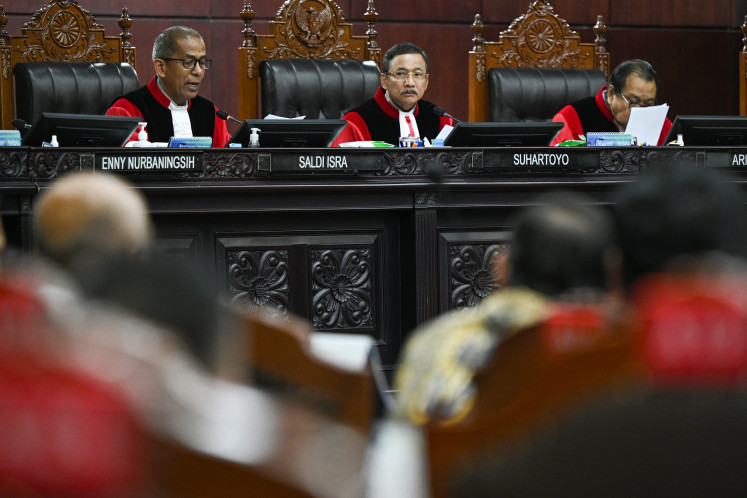Popular Reads
Top Results
Can't find what you're looking for?
View all search resultsPopular Reads
Top Results
Can't find what you're looking for?
View all search resultsBilingual education key to student success
Education experts have called on the Education Ministry to promote the simultaneous use of local and Indonesian languages during the early stages of education to further boost the accessibility of education, especially that of young children in remote areas
Change text size
Gift Premium Articles
to Anyone
E
ducation experts have called on the Education Ministry to promote the simultaneous use of local and Indonesian languages during the early stages of education to further boost the accessibility of education, especially that of young children in remote areas.
The Education Sector Analytical and Capacity Development Partnership (ACDP) Indonesia's lead advisor on regional programs and basic education, Basilius Bengoteku said that the use of the Indonesian language in schools in remote regions instead of students' native tongue could discourage them from participating in class and lead them to eventually drop out as most did not understand the language of instruction.
Data from ACDP Indonesia showed that only 63 percent of children aged five to 14 attended schools in remote regions, compared to 72 percent in cities.
The same data showed that in Papua, while 77 percent of children were registered in elementary school, only 27 percent continued to junior high school.
The ACDP blamed the high dropout rate on the use of Indonesian language in class.
'When teachers in school use the national language it sounds foreign [to students] because it is not their native tongue that they use daily. As a result the children don't understand the subject material that is being taught. They end up staying silent and become too embarrassed to answer questions,' Basilius said during a discussion on Wednesday.
He said that it was important for young children to be fluent in their native tongue first and use their first language to introduce them to the Indonesian language.
A 2011 UNESCO analytical review by Jessica Ball claims that children who are offered first language education are more likely to enrol and succeed in school while their parents are more likely to communicate with teachers and actively participate in their children's learning.
The same review said that children who abruptly receive formal education in a second language in early education do not master either the second language or their native tongue fully.
Veni Setiawati, the country director of Summer Institute of Linguistics (SIL) International Indonesia, said that schools needed to prepare for mother tongue education.
She said that all materials in class should first be translated into students' native toungue and recontextualized for the region.
'If there is a cow in a regular textbook then it should be changed into a pig for textbooks in Papua because cows are rarely seen there. However, they will eventually be introduced to the cow once the children's foundation in their first language is strong,' she said.
Veni said that the use of students' native tongue was also important to preserve local languages as the increasing use of the national language and globalization has threatened their existence.
According to the non-profit organization, whose main purpose is to study, develop and document languages, 13 out of Indonesia's 719 languages have become extinct as of 2015, while 75 languages are endangered and the number of speakers of 266 languages has decreased.
Although concerned, Basilius said that the 2015-2019 National Mid-Term Development Plan (RPJM) had made him optimistic about the increased use of mother tongue-based bilingual or multilingual education.
'The 2015-2019 RPJM is extremely explicit in that it stipulates that the native tongue must be used as the primary language in class until the third grade. This will be the gateway for all children to receive a good education,' he said.










